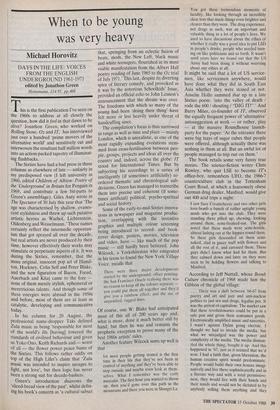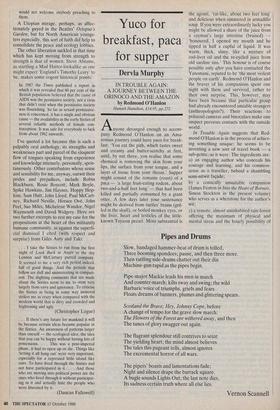When to be young was very heavy
Michael Horovitz
DAYS IN THE LIFE: VOICES FROM THE ENGLISH UNDERGROUND 1961-1971
edited by Jonathon Green
Heinemann, f14.95, pp.468
This is the first publication I've seen on the 1960s to address at all closely the question, how did it feel in that dawn to be alive? Jonathon Green, who worked on Rolling Stone, Oz and IT, has interviewed
just over a hundred 'prime movers of the alternative world' and sensitively cut and interwoven the resultant half million words into an action-packed tapestry of illuminat- ing flashbacks.
The Sixties have had a bad press in these columns as elsewhere of late — unfairly in my predisposed view (I left university in 1960, edited Children of Albion: Poetry of the 'Underground' in Britain for Penguin in 1969, and contribute a few bit-parts to Green's assemblage). Giles Auty wrote in The Spectator of 30 July this year that 'The age was characterised by shallow, evanes- cent stylishness and threw up such putative artistic heroes as Warhol, Lichtenstein, Oldenberg and Wesselmann.' These names certainly reflect the intermedic opportun- ism that got sprayed all over the decade, but real artists are never produced by their time, however effectively their works may stimulate or perpetuate aspects of it. It was during the Sixties, remember, that the more original, innocent pop art of Hamil- ton, Hockney, Colin Self and Peter Blake, and the new figuration of Bacon, Freud, Auerbach and Kitaj came to the fore none of them merely stylish, ephemeral or meretricious talents. And though some of these energies were abroad in the 1950s and before, most of them are at least as catalytic, developing and communicative today.
In his column for 20 August, the professional name-dropper Taki defined Zulu music as being 'responsible for most of the world's ills [having] lowered the standards of civilised behaviour and given us Yoko Ono, Keith Richards and — worst of all — the flower power peace bums of the Sixties. This follows rather oddly on top of the High Lifer's claim that 'Zulu music was intended to inspire savages to fight, not love', but then logic has never been a strong suit for decade-bashers.
Green's introduction disavows the `sliced-bread view of the past', whilst defin- ing his book's concern as 'a cultural subset
that, springing from an eclectic fusion of beats, mods, the New Left, black music and white teenagers, flourished in its most visible manifestation from the Albert Hall poetry reading of June 1965 to the Oz trial of July 1971.' This last, despite its diverting spice of literary comedy, and provoked as it was by the notorious Schoolkids' Issue, provided an official echo to John Lennon's announcement that the dream was over. The freedoms with which so many of the young had been 'doing their thing' have felt more or less heavily under threat of handcuffing since.
The compilation's focus is thus narrowed in range as well as time and place — mainly London, which is unrealistic, as one of the most rapidly expanding evolutions stem- med from cross-fertilisation between peo- ple, groups, projects and ideas all over the country and, indeed, across the globe: IT stood for International Times. But by subjecting his recordings to a series of intelligently (if sometimes artificially) re- ordered thematic and chronological sub- divisions, Green has managed to transcribe them into precise and coherent (if some- times artificial) political, psycho-spiritual and social history.
Some of the early-to-mid-Sixties innova- tions in newspaper and magazine produc- tion, overlapping with the inventive graphics and multiple colour screening being introduced to record- and book- cover design, posters, movies, television and video, have — like much of the pop music — still hardly been bettered. John Wilcock, a Yorkshireman who emigrated in his teens to found the New York Village Voice, recalls that There were three major developments started by the underground: offset printing; the San Francisco Oracle realising there was no reason to keep all the colours separate you could put them all together and they'd give you a rainbow effect; and the use of unjustified, ragged lines.
Of course, one W. Blake had anticipated most of this all of 200 years ago and, what is more, done it much better still by hand; but then he was and remains the prophetic exception to prove many of the best 1960s artists' rules.
Another feature Wilcock sums up well is that
for most people getting stoned is the first time in their life that they've not been in control of anything and they've been able to step outside and maybe even look at them- selves. What I remember was the early mescalin. The first hour you wanted to throw up, then you'd gone over this path in the mountains and there you were in Shangri-La. You got these tremendous moments of lucidity, like looking through an incredibly clear lens that made things even brighter and clearer than they were. The drug experience, not drugs as such, was an important and valuable thing in a lot of people's lives. We used to have discussions about the ethics of whether it really was a good idea to put LSD in people's drinks, people who needed turn- ing on like politicians and so forth. It wasn't until years later we found out that the US Army had been doing it without worrying about any ethics at all.
It might be said that a lot of US service- men, like servicemen anywhere, would have done what they did in South East Asia whether they were stoned or not. Anselm Hollo summed that up in a late Sixties poem: 'into the valley of death / rode the 600 / shouting / "DIG IT!" ' And Barry Miles, co-founder of IT, observed the equally frequent power of 'alternative' autosuggestion at work — or rather, play — at the massive Roundhouse launch- party for the paper: 'At the entrance there were big trays of sugar cubes that people were offered, although actually there was nothing in them at all. But an awful lot of people managed to trip out on them.'
The book retails some very funny true stories. The science-fiction writer Chris Rowley, who quit LSE to become IT's office-boy, remembers UFO, the 1966-7 counterculture club in the Tottenham Court Road, at which a fearsomely obese German drug dealer, Manfred, would give out 400 acid trips a night: I saw Susy Creamcheese and two other girls love-bomb a bunch of rather uptight young mods who got into the club. They were standing there pilled up, chewing, looking around them, semi-freaked-out. The girls noted that these mods were semi-hostile, almost lashing out at the hippies round them. So these girls descended on them semi- naked, clad in gauzy stuff with flowers and all the rest of it, and caressed them. These guys didn't know what had hit them. But they calmed down and later on they were seen to be holding flowers and talking to Manfred.
According to Jeff Nuttall, whose Bomb Culture chronicle of 1968 made him the Gibbon of the global village: . There was a shift between '66-67 from
poetry and art and jazz and anti-nuclear politics to just sex and drugs, legalise pot. It was the arrival of capitalism. The market saw that these revolutionaries could be put in a safe pen and given their consumer goods. Electronically amplified music and narcotics. I wasn't against Dylan going electric. I thought we had to invade the media, but what we misjudged was the power and complexity of the media. The media disman- tled the whole thing. bought it up. And this happened in '67, just as it seemed that we'd won. I had a faith that, given liberation, the human creative spirit would predominate. People would build their own houses imagi- natively and live there sophisticatedly and in a literate way and with a total permissive- ness, they would live with their hands and their minds and would not be dictated to by anybody selling them anything and they
would not welcome anybody preaching to them.
A Utopian mirage, perhaps, as affec- tionately guyed in the Beatles' Octopus's Garden; but for North American youngs- ters especially, this sort of faith did help to consolidate the peace and ecology lobbies.
The other liberation suckled in that time which has kept moving from strength to strength is that of women. Steve Abrams, as startling a Mad Hatter-lookalike as one might expect 'England's Timothy Leary' to be, makes some cogent historical points:
In 1987 the Times published a report in which it was revealed that 60 per cent of the British population believed that the cause of AIDS was the permissive society, not a virus that didn't exist when the permissive society was flourishing. So far as sexual permissive- ness is concerned, it has a single and obvious
cause the availability in the early Sixties of several reliable methods of female con- traception. It was safe for everybody to fuck from about 1962 onwards.
I've quoted a lot because this is such a palpably oral anthology, its strengths and weaknesses part and parcel of the eloquent flow of tongues speaking from experience and knowledge intensely, personally, spon- taneously. Other contributors whose sense and sensibility for me, anyway, outwit their prides and prejudices, include Robin Blackburn, Rosie Boycott, Mark Boyle, Spike Hawkins, Jim Haynes, Hoppy Hop- kins, Sam Hutt, John Lloyd, Paul McCart- ney, Richard Neville, Horace Ove, John Peel, Sue Miles, Michelene Wandor, Nigel Waymouth and David Widgery. Here are two further excerpts to rest my case for the propositions at the heart of this militantly humane community, as against the superfi- cial dismissal I cited (with respect and surprise) from Giles Auty and Taki:
. . . I take the Sixties to run from the first night of Look Back in Anger to the day Lennon and McCartney parted company. It seemed to me a very rich period indeed, full of good things. And the periods that follow are dull and uninteresting in compari- son. The slighting comments that are made about the Sixties seem to me to stem very largely from envy and ignorance. To criticise the Sixties as being in some way immoral strikes me as crazy when compared with the modern world that is dirty and crowded and frightening and ugly.
(Christopher Logue)
. . If there's any future for mankind it will be because certain ideas became popular in the Sixties. An awareness of patterns larger than oneself — the ecological idea; the idea that you can be happy without having lots of possessions. . . . This was a post-imperial phase, it had to open up or die. Things like `letting it all hang out' were very important, especially for a repressed little island like ours. To have lived through the Sixties and not have participated in it. . . . And those who are moving into political power are the ones who lived through it without participat- ing in it and actually hate the people who were liberated by it.
(Duncan Fallowell)



























































 Previous page
Previous page